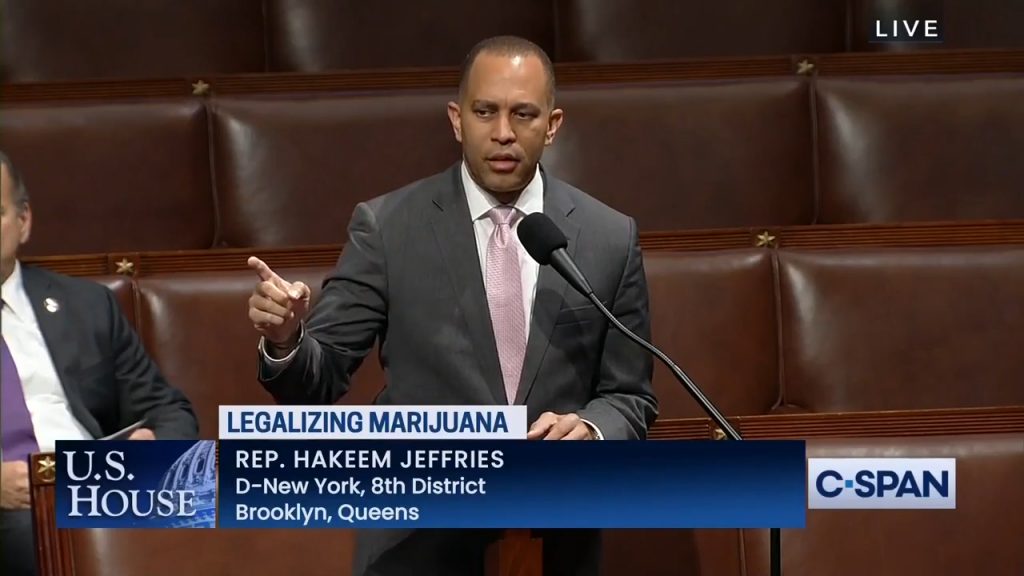REP. JEFFRIES: IT’S TIME TO END THE FEDERAL CANNABIS PROHIBITION
WASHINGTON, D.C. – Today, the U.S. House of Representatives passed H.R. 3617, the Marijuana Opportunity Reinvestment and Expungement (MORE) Act of 2021. The bipartisan legislation would end the federal prohibition and criminalization of marijuana by removing it from the Controlled Substances Act and facilitate the expungement of low-level federal marijuana convictions, as well as incentivizing state and local governments to do the same.
When the House passed this groundbreaking bill in the 116th Congress in 2020 it marked the first time since the passage of the Controlled Substances Act of 1970 that a Congressional chamber voted on legislation to remove marijuana from its prohibitive classification under federal law.

Remarks as delivered:
Richard Nixon began the failed war on drugs a little over 50 years ago in 1971.
At the time, there were less than 300,000 Americans incarcerated in this country.
Today, there are 2.3 million, disproportionately Black and Latino.
Many of those individuals who have been incarcerated are there because of nonviolent drug offenses, often marijuana possession and use.
The United States of America incarcerates more people than any other country in the world, including per capita China and Russia combined.
That’s a stain on our democracy.
We have an overcriminalization problem in America.
We have a mass incarceration problem in America.
We have a prison industrial complex in America.
It doesn’t advance public safety and it hurts economic development.
It has ruined individuals, ruined lives, ruined families and ruined communities, particularly in communities of color.
It’s time to end the federal cannabis prohibition.
It’s time to deschedule it.
It’s time to decriminalize marijuana.
It’s time to invest in communities in a way that makes sense, both from a public safety standpoint as well as a fairness, equity and justice standpoint.
It’s time to pass the MORE act.
Background:
The current federal prohibition on marijuana is codified in federal law under the Controlled Substances Act, enacted in 1970 and signed by President Richard Nixon. Under that statute, marijuana is a Schedule I substance, the same classification as heroin and LSD, and a higher schedule than cocaine, meth or fentanyl.
Marijuana prohibition laws result in over 600,000 arrests each year, with 90% of those arrests for simple possession. Black Americans are four times more likely to be arrested for marijuana charges than white Americans, despite using marijuana at comparable rates. In 2019, over 2.3 million Americans were incarcerated, one in five of them for non-violent drug possession.
The failed war on drugs has cost our country roughly $1 trillion. Economists estimate that criminal justice expenditures related to cannabis prohibition costs states roughly $6 billion and the federal government $4 billion per year.
State-legal cannabis sales will exceed $12 billion in 2020. However, people of color still face barriers to enter and benefit from the cannabis industry, including state requirements that marijuana business license applicants or employees have no criminal record. Only 20% of business owners in this industry are people of color, and the percentage of women-owned businesses has fallen by 9% in recent years.
The Marijuana Opportunity, Reinvestment, and Expungement (MORE) Act would:
- Decriminalize marijuana at the federal level by removing the substance from the Controlled Substances Act, apply this retroactively to prior and pending convictions and enable states to set their own policies.
- Require federal courts to expunge marijuana arrests and convictions and resentence those still in custody or under court supervision for a marijuana offense.
- Prevent the government from denying an individual their federal benefits, student financial aid or security clearances needed to obtain government jobs because of marijuana use.
- Authorize the assessment of a 5% excise tax on marijuana sales at the manufacturer level to fund programs to provide services to individuals most adversely impacted by the War on Drugs, including reentry services, job training and substance use treatment.
- Fund equitable licensing programs so that states and localities can implement inclusive marijuana licensing systems that minimize barriers to marijuana licensing and maximize employment for individuals most adversely impacted by the War on Drugs.
- Open up Small Business Administration resources for legitimate cannabis-related businesses and service providers.
- Require the Bureau of Labor Statistics to collect data on the demographics of the industry to ensure equitable participation.